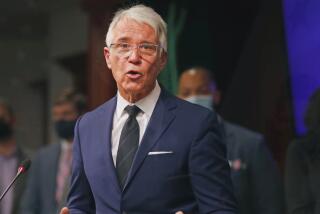Making a Bad Recall Worse
The California recall election gained another helping of cinematic absurdity Monday, as a three-judge federal court panel delayed the Oct. 7 vote. By worrying disproportionately about the possibility of punch-card ballot problems, the court came up with a decision that, if it holds, ensures that CaliforniaŌĆÖs politics and economy will remain in an intolerable limbo for six more months.
Less drastic remedies -- for example, ordering added precautions and poll workers -- could have mitigated the potential ballot-counting problems that plagued FloridaŌĆÖs punch-card machines in the 2000 presidential election. This editorial page agrees with the earlier ruling by U.S. District Judge Stephen V. Wilson, who said Aug. 20 in Los Angeles that the short recall campaign was required under the California Constitution, and that ŌĆ£delaying the election for half a year ... undoubtedly works against the public interest implicit in a recall election.ŌĆØ
We have strongly opposed, and continue to oppose, this recall. It is an abuse of the voter initiative process when a well-financed political rival can, in effect, pay for an election replay. The replay itself is undemocratic, allowing a winner-take-all battle among challengers that could elect one of them with a fraction of the support that the duly elected governor still holds. If it succeeds, it is likely to join the arsenal of ordinary political weapons, increasing the stateŌĆÖs ungovernability. Nevertheless, something more than statistical hand-wringing about chads should be required before throwing out an election for which absentee voting has already begun.
This latest round of the recall battle is another sequel to the corrosive political thriller that wonŌĆÖt go away, a real-life Revenge of the Ideologues. This time itŌĆÖs called California Recall. Plot points vary, but they all have in common the rotten whiff of partisanship run amok. Nothing matters except to win. It doesnŌĆÖt matter if there is no sense of fair play; it doesnŌĆÖt matter if it becomes nearly impossible to govern -- as long as you can show You Are Right. And They Are Wrong.
The political drive for retribution started before the presidential election of 2000, but the events of that year upped the ante. The U.S. Supreme Court after the disputed presidential election said that a lack of uniform standards among FloridaŌĆÖs counties created the possibility that ballots in certain parts of the state were more likely to be counted than in others, violating the U.S. ConstitutionŌĆÖs equal protection clause. That decision by the Republican-appointed majority benefited George W. Bush and his supporters.
In filing its lawsuit to stop the Oct. 7 recall, the American Civil Liberties Union turned the tables, using the same equal protection argument in asking the court to delay the recall vote. The decision by the Democrat-appointed panel benefited Gov. Gray Davis and his supporters.
Score one for your side. Or their side. But the business of the people remains undone and unattended.
State courts, up to the state Supreme Court, upheld the Oct. 7 election. The U.S. Supreme Court should bow to those courts and overturn the federal appeals courtŌĆÖs ruling. Let the state take proper and fair voting precautions and get on with it. This endless political one-upmanship really amounts to political murder-suicide. In the end, no one wins, except for the ideologues keeping score in their increasingly isolated corners.
More to Read
Get the L.A. Times Politics newsletter
Deeply reported insights into legislation, politics and policy from Sacramento, Washington and beyond. In your inbox three times per week.
You may occasionally receive promotional content from the Los Angeles Times.



![[20060326 (LA/A20) -- STATING THE CASE: Marchers organized by unions, religious organizations and immigrants rights groups carry signs and chant in downtown L.A. "People are really upset that all the work they do, everything that they give to this nation, is ignored," said Angelica Salas of the Coalition of Humane Immigrant Rights. -- PHOTOGRAPHER: Photographs by Gina Ferazzi The Los Angeles Times] *** [Ferazzi, Gina -- - 109170.ME.0325.rights.12.GMF- Gina Ferazzi/Los Angeles Times - Thousands of protesters march to city hall in downtown Los Angeles Saturday, March 25, 2006. They are protesting against House-passed HR 4437, an anti-immigration bill that opponents say will criminalize millions of immigrant families and anyone who comes into contact with them.]](https://ca-times.brightspotcdn.com/dims4/default/34f403d/2147483647/strip/true/crop/1983x1322+109+0/resize/840x560!/quality/75/?url=https%3A%2F%2Fcalifornia-times-brightspot.s3.amazonaws.com%2Fzbk%2Fdamlat_images%2FLA%2FLA_PHOTO_ARCHIVE%2FSDOCS%2854%29%2Fkx3lslnc.JPG)






